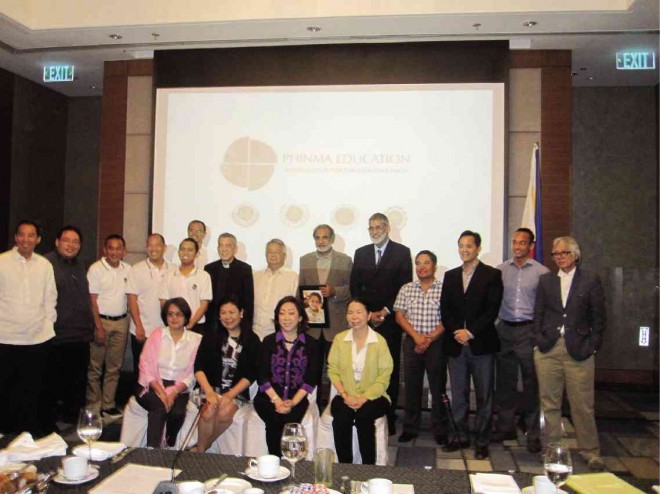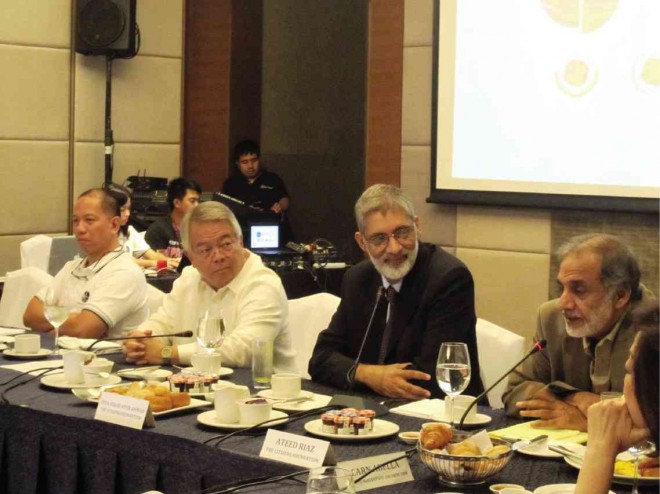With teachers in school, students will come

PHINMA president Ramon del Rosario (center, in barong) and TCF officials, with representatives of Phinma Education Network partners
When The Citizens Foundation (TCF) set out on its campaign to help reduce illiteracy in Pakistan, which has the second largest out-of-school population in the world, the founders realized a key issue they had to address was “getting teachers to school.”
Ateed Riaz, one of the founders, said, “If there are teachers, then students will go to school.” Riaz and TCF chief executive officer and president Syed Asaad Ayub Ahmad were guests at the Roundtable Discussion on Business, Education and Poverty Alleviation organized by Phinma Education Network.
An initiative of six Pakistani business leaders and executives and one of this year’s Ramon Magsaysay Award recipients, TCF gives so much importance to teachers that it provides transport for them from home to school and back.
Karachi-based nonprofit TCF aims “to remove barriers of class and privilege” through affordable quality education and “to make the citizens of Pakistan agents of positive change.”
TCF pays close attention to the safety and comfort of its teachers because it recruited all-female faculties for its network of now 1,000 schools in over 100 towns and cities.
The “free door-to-door transport facility is provided … to prevent absenteeism and as an incentive for qualified women to join the workforce,” it said.
Riaz said the free transport “gives teachers a lot of respect in their communities.” Although they were paid lower than those in government, he said, teachers claimed they were happier and their quality of life had improved.
Ahmad said that with each school having a van just for teachers, TCF had to have a fleet management system in TCF’s structure. The fleet of vehicles, Ahmad said, was “run like a transport company.”
The recruitment of female teachers was part of TCF’s strategy to achieve one of its major goals, educating girls who “have trouble accessing schools.”
It found that male teachers, aside from lack of basic necessities like bathrooms and water, discouraged parents from sending their daughters to school.
Distance was another obstacle to girls’ participation in the educational system. “Enrollment drops by 20 percent for every 500 meters that a girl has to travel to school,” TCF said.
There were also cultural and financial constraints though Ahmad and Riaz dispelled the notion that Pakistani parents did not want their daughters educated.
Evidence showed that cost, rather than opposition to the education of girls, prevented parents from sending daughters to school. High fees, TCF found, “make parents compromise on the number of children sent to school, often only sending the brightest of all the siblings or only the sons.”
Ahmad said they deliberately built their schools near or in the heart of low-income communities that are within walking distance for the safety and security of the kids, particularly the girls.
He said the all-women faculty and fully functioning facilities like toilets with running water “made parents feel comfortable about sending their kids to school.”
At present, some 47 percent of students in TCF’s 1,000 schools are girls. TCF wants to have a 50-50 ratio of boys to girls.
TCF’s decision to actively campaign for the enrollment of girls stemmed from its realization that insecurity caused by illiteracy and innumeracy “especially impacts the well-being of women—many studies have shown that education helps control population growth by spacing child birth, reduces child mortality …. Educated women have healthier families, which has profound implications in poor countries where up to 40 percent of deaths are caused by completely preventable diseases.”
TCF are affordable so all children who need to be in school can attend, with subsidized fees ranging from 10 cents to $3.75. It has adopted a “pay-what-you-can-afford” fee structure so children, even in the most underprivileged areas, will have no reason not to attend school. Books are free and uniforms are provided to the neediest students.
To finance its ambitious project, TCF not only tapped the usual donors—corporations and charitable individuals—but appealed to the sense of patriotism of the Pakistani diaspora.
TCF Chapters, registered as tax-exempt charities, were set up in the United States, United Kingdom, Canada, United Arab Emirates, among other places. Support groups were also established in seven other countries.
Through the chapters, “TCF has managed to rally the base of nonresident or expatriate Pakistanis, which accounted for 47 percent of the overall funding in 2013.”
After 18 years (TCF was founded in 1996), Riaz said, the organization had “created a culture that gives teachers and students pride.”
Moreover, the higher literacy and numeracy levels reached by TCF students were creating a ripple effect. Ahmad said they were now also focusing on adult literacy, targeting some 7,000 women this year.
“Education is absolutely transformative for adults, primarily the mothers of students who felt frustrated because they could not teach their kids,” Riaz said. He mentioned one woman who was so happy that she learned to count and could not be cheated anymore when she went to the market.
Reacting to the presentation, Luigi Bernas of Synergia Foundation, a coalition of people and groups working to improve basic education in the Philippines, said they were working with local school boards as the national educational system was preoccupied with long-standing problems like lack of textbooks, teachers and classrooms.
Dr. Jaime Aristotle Alip talked about how microfinancing was helping keep students in school through small loans to pay for basic necessities.
Beth Lui of Liveit Investments gave a brief presentation on Affordable Private Education Center, a joint venture between Ayala Corp. and Pearson, which aims to make high school graduates more employable or better prepared for college work.
De La Salle University’s Br. Jose Mari Jimenez, FSC, said the school was aiming to have at least 20 percent of its student population on scholarships, as part of its goal to make education more accessible.















